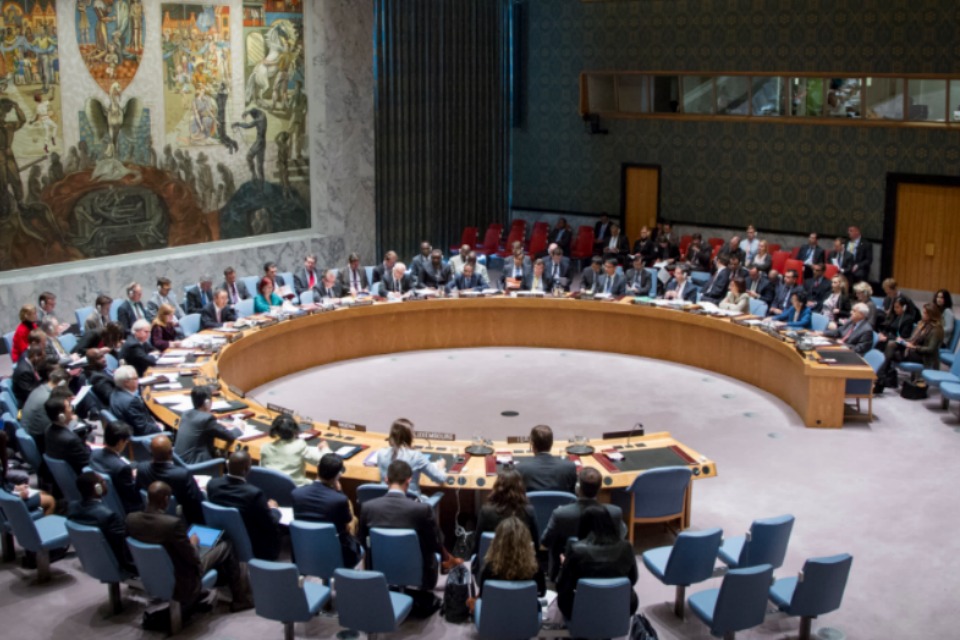UK remains deeply concerned by the situation in Ukraine
Statement by Ambassador Lyall Grant of the UK Mission to the UN to the Security Council Briefing on Ukraine

Madam President
The United Kingdom requested this morning’s briefing because we remain deeply concerned by the situation in Ukraine. The illegal annexation of Crimea, the dire human rights situation there, and in the east of Ukraine, and Russia’s failure to implement its commitments under the Minsk agreements leave us in no doubt that the situation continues to present a clear threat to international peace and security.
I am grateful for Assistant-Secretary-General Simonovic’s briefing and the United Kingdom welcomes the work of the Human Rights Monitoring Mission. Their objective and impartial reporting cuts through Russia’s misinformation and propaganda. Their sixth report lays bare the grim reality of life in separatist controlled areas in Donetsk and Luhansk, where “armed groups continued to terrorise the population” and “there is a complete breakdown of law and order”.
In these areas killings, abductions, torture and other serious human rights abuses carry on unchecked and neither protection nor justice is available to victims. The OHCHR are rightly concerned about a lack of accountability. It is essential that independent investigations take place into all serious allegations of violations, whoever the perpetrators are.
We are concerned by the Human Rights Watch report this week alleging the use of cluster munitions by the Ukrainian army. We are aware that Ukraine refutes these allegations and denies that the Ukrainian Army uses such munitions. We also note that the OSCE has said today that their monitors have seen no evidence of cluster bombs. And we welcome Ukraine’s commitment to cooperate with Human Rights Watch and to a further investigation into these claims.
We are deeply concerned by the OHCHR’s report’s account of a deteriorating human rights situation in the illegally annexed Crimean peninsula. The introduction of Russian Federation legislation, in contravention of General Assembly resolution 68/262, has curtailed freedoms of expression, peaceful assembly, association, religion or belief.
The treatment of the Crimean Tatar population is particularly troubling. Russia has often claimed to have concerns about the rights of minority populations in Ukraine but we see no evidence of that concern for the rights of the Tatars in Crimea.
The humanitarian situation in the areas controlled by the armed separatist groups remains precarious and will become more serious as winter approaches but the sending of convoys into Ukraine by Russia without the agreement of the Government of Ukraine in breach of Ukraine’s sovereignty is a provocative act and must not be repeated. Humanitarian assistance is necessary, but this must be an international effort, coordinated by the appropriate agencies and with the agreement of the Government of Ukraine.
If Russia wants to support an improvement in the lives of civilians living in East Ukraine it should immediately withdraw its remaining military forces from Ukraine, stop its flow of weapons to the separatists, and instead help to restore Ukrainian sovereignty and to secure a political solution to this crisis.
Madam President,
Assistant-Secretary-General Fernandez-Taranco’s briefing described the fragility of the situation in eastern Ukraine, where fighting continues and violations of the ceasefire continue on a daily basis.
The Minsk agreements offer a real prospect of de-escalating tensions in eastern Ukraine. All parties must match words with actions and implement the commitments they have made.
The Government of Ukraine has taken important steps, including approval of a special status for districts of Donetsk and Luhansk oblast; an amnesty law, which, as the OHCHR report notes, meets international human rights standards; and the Government is now preparing for local elections to be held under Ukrainian law in separatist-controlled areas of Luhansk and Donetsk.
Russia, by contrast, continues to supply separatists with weapons and materiel – including multiple rocket launchers and artillery; continues to maintain several hundred of its forces in Ukrainian territory; and in yet another ominous reminder of the tactics it used to shape the frozen conflicts in Moldova and Georgia, is handing out passports to individuals in separatist-held areas.
Madam President
As the Minsk agreements make clear - in order for the situation in eastern Ukraine to stabilise, it is vital that all illegally armed groups, military equipment, fighters and mercenaries are withdrawn and the Ukrainian-Russian border secured with increased monitoring under OSCE verification.
If Russia is committed to these agreements, then why, on Wednesday this week in Vienna, did they block the expansion of OSCE border monitoring mission? This violates Article 4 of the Minsk Protocol and demonstrates that Russia is seeking to prevent effective monitoring of its border to allow it to continue to supply weapons and equipment to militant groups.
Stability will not be restored if Russia continues to support separatist groups whose leaders have expressed their intentions to expand the territory under their control.
Madam President
This Sunday’s parliamentary elections mark Ukraine’s commitment to democracy. They must be allowed to go ahead without external interference. The Ukrainian authorities are taking steps to ensure that as many Ukrainian citizens as possible can exercise their right to vote, including by putting in place arrangements for people displaced from their homes by the instability in the east and those from the illegally annexed territory of Crimea.
Our expectation is that Russia, as a permanent member of this Council and as a party to the Minsk agreements, will work to restore peace and security in Ukraine by respecting the outcome of these elections and supporting the forthcoming local elections held under Ukrainian law.
We urge them not to renege on the commitments they have made, but rather to use their influence to prevent any separate elections being organised by separatists in Donetsk or Luhansk in November. Such elections would be illegal, would contravene the Minsk agreements and present a significant obstacle to a lasting peace in Ukraine.
I thank you.